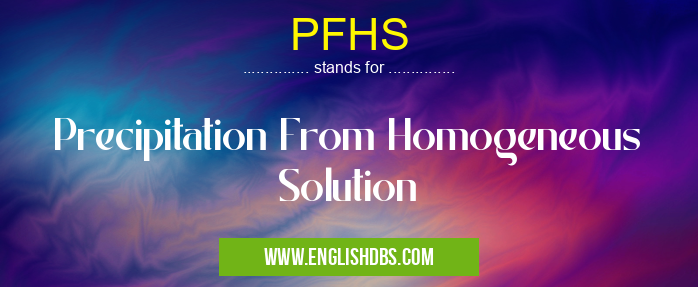What does PFHS mean in UNCLASSIFIED
Precipitation From Homogeneous Solution (PFHS) is a technique used in the preparation of nanomaterials. It involves the precipitation of a desired material from a homogeneous solution by controlling the chemical reactions and conditions. PFHS offers precise control over particle size, morphology, and composition, making it a versatile method for synthesizing a wide range of nanomaterials.

PFHS meaning in Unclassified in Miscellaneous
PFHS mostly used in an acronym Unclassified in Category Miscellaneous that means Precipitation From Homogeneous Solution
Shorthand: PFHS,
Full Form: Precipitation From Homogeneous Solution
For more information of "Precipitation From Homogeneous Solution", see the section below.
Principle of PFHS
In PFHS, a precursor solution containing the desired material's ions or molecules is prepared. The solution is maintained under homogeneous conditions, ensuring uniform distribution of the reactants. A precipitating agent is then added to the solution, initiating the formation of the desired material through a chemical reaction.
Advantages of PFHS
- Precise Control: PFHS allows precise control over particle size, morphology, and composition, enabling the synthesis of nanomaterials with tailored properties.
- High Purity: The homogeneous solution ensures uniform distribution of reactants, minimizing the formation of impurities and defects.
- Versatility: PFHS is applicable to a wide range of materials, including metals, oxides, and semiconductors.
- Scalability: The process can be scaled up to produce large quantities of nanomaterials.
Applications of PFHS
PFHS has found applications in various fields, including:
- Catalysis: Synthesis of highly active and selective catalysts for chemical reactions.
- Electronics: Fabrication of semiconductors and electronic devices with controlled properties.
- Energy: Development of efficient energy storage and conversion materials.
- Biomedicine: Preparation of nanocarriers for targeted drug delivery and biosensing.
Essential Questions and Answers on Precipitation From Homogeneous Solution in "MISCELLANEOUS»UNFILED"
What is Precipitation From Homogeneous Solution (PFHS)?
PFHS is a chemical process where a solid substance precipitates out of a homogeneous solution. This happens when the solution becomes supersaturated, meaning it contains more of the dissolved substance than it can hold at a given temperature. The solid that forms is called a precipitate.
What are the key factors that influence PFHS?
The main factors that affect PFHS are:
- Solubility: The solubility of the substance in the solvent determines how much of it can be dissolved.
- Temperature: Increasing temperature usually increases solubility, while decreasing temperature can lead to precipitation.
- Concentration: The concentration of the dissolved substance affects the rate of precipitation.
- Presence of impurities: Impurities can act as nucleation sites for precipitation.
What are the common applications of PFHS?
PFHS is used in various fields, including:
- Chemical synthesis: To prepare specific compounds by selectively precipitating them from solution.
- Water treatment: To remove impurities and clarify water.
- Pharmaceutical industry: To produce drugs and other pharmaceutical products.
- Materials science: To create materials with specific properties, such as semiconductors and ceramics.
How can PFHS be controlled or prevented?
PFHS can be controlled or prevented by:
- Controlling temperature: Maintaining the solution at a suitable temperature to avoid supersaturation.
- Adding stabilizers: Adding substances that inhibit precipitation, such as surfactants or polymers.
- Seeding the solution: Introducing small crystals of the precipitate to provide nucleation sites and promote precipitation.
What are the advantages and disadvantages of PFHS?
Advantages:**
- High efficiency and selectivity in separating solids from solutions.
- Can be used to produce materials with specific properties.
- Relatively simple and cost-effective process.
Disadvantages:
- Can be sensitive to impurities and changes in conditions.
- May require additional steps to remove impurities or stabilize the precipitate.
Final Words: PFHS is a powerful technique for synthesizing nanomaterials with controlled size, morphology, and composition. Its advantages in precision, purity, versatility, and scalability make it a valuable tool in various scientific and technological applications. The ongoing research in PFHS continues to explore new possibilities and advancements in nanomaterials synthesis.
